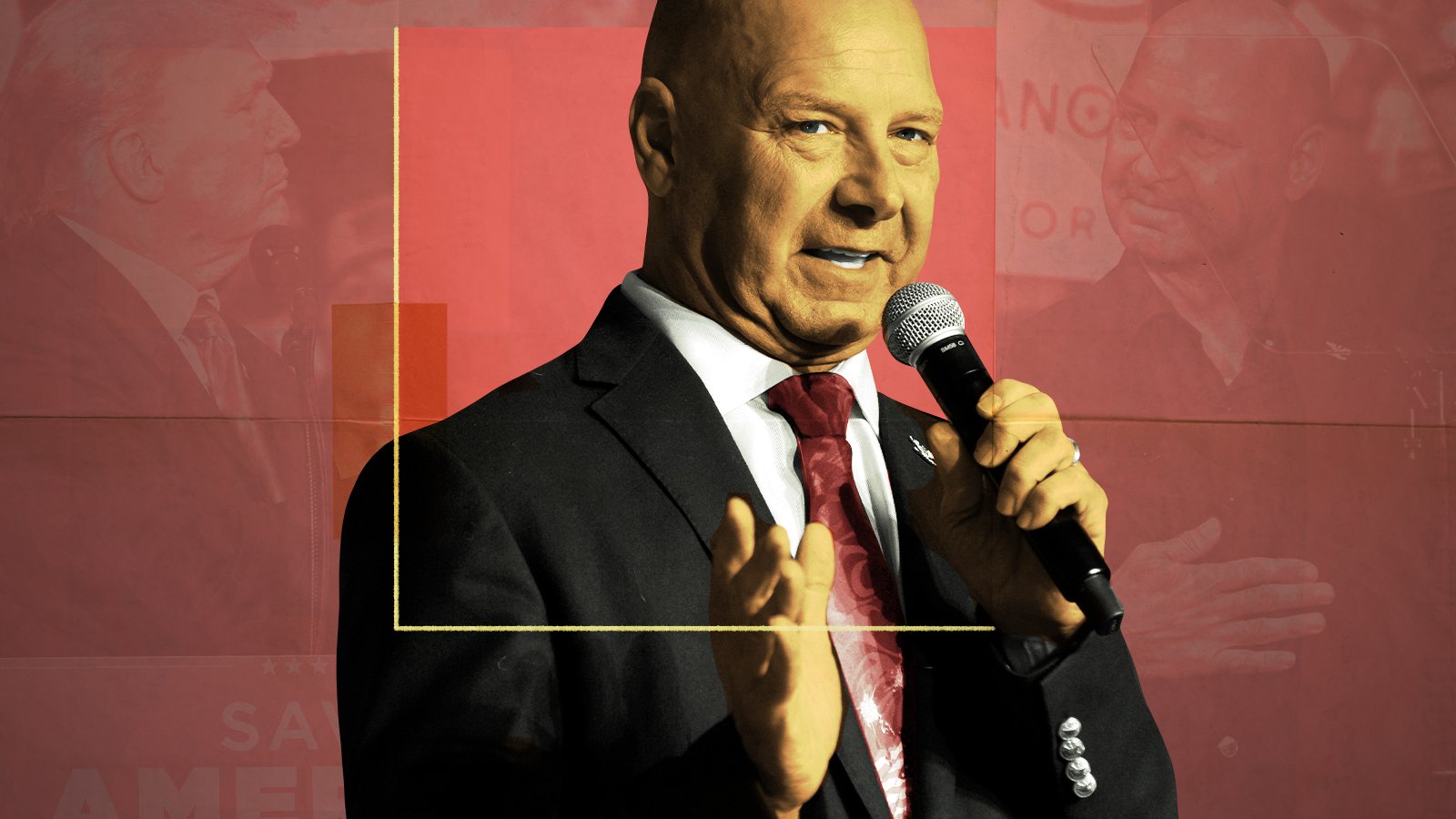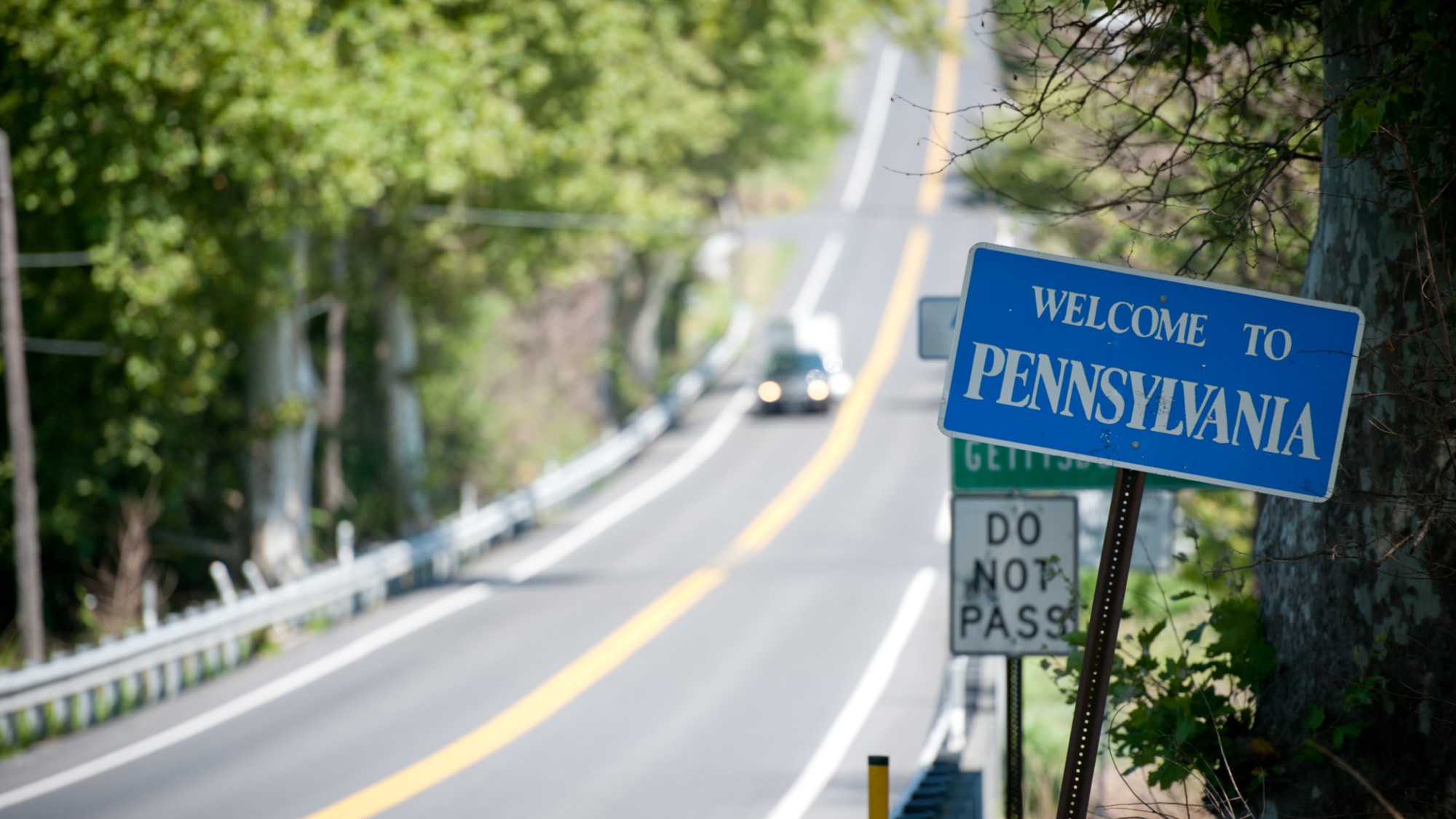Doug Mastriano's controversial run for governor in Pennsylvania, explained
Why the GOP candidate is attracting so much attention


A free daily email with the biggest news stories of the day – and the best features from TheWeek.com
You are now subscribed
Your newsletter sign-up was successful
There are 36 gubernatorial elections across the United States this year, but one race — and one candidate in particular — is drawing an extraordinary amount of attention: Doug Mastriano, the Republican nominee to be Pennsylvania's chief executive.
Not all the attention is good, admittedly.
For example: Conservative columnist George Will labeled Mastriano a "special danger" to the nation. Why? Because in a party full of candidates who go along with the lie that Donald Trump won the 2020 presidential election, Mastriano really stands out. He burst onto the national scene in 2021 when he chartered buses to carry protesters to the Jan. 6 "Stop the Steal" rally in Washington D.C. Critics label him a "Christian nationalist," his campaign locks reporters out of its events, and Republican donors are reportedly sitting out the race. How did Mastriano get to be so controversial? Here's everything you need to know:
The Week
Escape your echo chamber. Get the facts behind the news, plus analysis from multiple perspectives.

Sign up for The Week's Free Newsletters
From our morning news briefing to a weekly Good News Newsletter, get the best of The Week delivered directly to your inbox.
From our morning news briefing to a weekly Good News Newsletter, get the best of The Week delivered directly to your inbox.
Who is Doug Mastriano, anyway?
He's a former Army officer who currently serves in the Pennsylvania Senate. He was relatively unknown, though, until the 2020 election when he "rose to prominence in the aftermath of the 2020 election by falsely claiming Trump won the state," The Washington Post reports. He didn't stop there: In addition to his false claims, "Mastriano wanted Republicans, who control both chambers in the Pennsylvania state legislature, to name their own winner" instead of accepting the winner of the popular vote in his state. As a result of all his efforts to overturn the election in Trump's favor, Mastriano has been subpoenaed by the Jan. 6 Committee investigating the insurrection.
Yes, but don't lots of Republicans claim Trump won in 2020?
Sure, but that's hardly the only thing notable about Mastriano. He brings a greater amount of religious fervor to the public stage than most other politicians, including many social conservatives. "He has come to embody a set of beliefs characterized as Christian nationalism, which center on the idea that God intended America to be a Christian nation, and which, when mingled with conspiracy theory and white nationalism, helped to fuel the insurrection," The New Yorker reported in a May profile.
Mastriano himself has rejected the "Christian nationalist" label. But he has come under fire for a $5,000 payment his campaign made to Gab, a far-right social media site, for consulting services. Gab's founder, Andrew Torba, then "repeatedly made antisemitic remarks and said in one video that neither he nor Mr. Mastriano would give interviews to non-Christian journalists," The New York Times reported in July. Mastriano quickly distanced himself. "Andrew Torba doesn't speak for me or my campaign,'' Mr. Mastriano wrote in a statement released on Twitter. "I reject anti-Semitism in any form."
Anything else?
On Tuesday, NBC reported that in 2019, Mastriano suggested in a radio interview that women who violated his proposed abortion ban should be charged with murder. Cornell's Glenn C. Altschuler listed some other controversies in a recent column for The Hill: Mastriano "has shared more than 50 tweets with the QAnon hashtag," once "posted a video claiming that COVID-19 is a 'government sponsored virus'" and also "ridicules climate change as 'fake science.'" He also "opposes gay marriage, opposes allowing gays to serve in the U.S. military, and opposes the right of gay couples to adopt children."
A free daily email with the biggest news stories of the day – and the best features from TheWeek.com
Go back to the election stuff. Why does that matter so much?
In many states, the top election official is an elected position. In Pennsylvania, that person is appointed by the governor. That gives the governor "immense power over elections," States Newsroom reports. Mastriano has "vowed that his pick for the state's top election official would require everyone to 're-register" to vote'" — that's illegal under federal law — and there is speculation that "a secretary of state under Mastriano could try to refuse to certify election results from Democratic-leaning counties."
So this is a good place to remember that Pennsylvania isn't just a swing state — it might be the swing state. "The Pennsylvania governor's race is perhaps the most consequential in the country," The New York Times notes. All that means a Mastriano victory in the November election could have an extraordinary impact on the results of the 2024 presidential election.
What are his chances of winning, then?
Given all the attention, you might think the Pennsylvania gubernatorial race is close. Instead, it appears that Mastriano is trailing his opponent — Attorney General Josh Shapiro, a Democrat — by a considerable margin. A poll released this week shows Shapiro leading the way with 52 percent of voters, while Mastriano comes in with just 37 percent support.
It's difficult to see Mastriano making enough headway between now and the election to make up the difference: The New York Times sums up his campaign in a headline as "No TV Ads, Tiny Crowds, Little Money." The Republican Governors Association isn't putting money into the race, and Mastriano's campaign has been notably absent from the airwaves. Some of his supporters believe Mastriano can pull off a surprise "grassroots" victory, but professional political operatives are skeptical. "I guess," one said, that "we're going to have to wait until Nov. 8 to see whether you can pull something like that off."
Joel Mathis is a writer with 30 years of newspaper and online journalism experience. His work also regularly appears in National Geographic and The Kansas City Star. His awards include best online commentary at the Online News Association and (twice) at the City and Regional Magazine Association.
-
 Crisis in Cuba: a ‘golden opportunity’ for Washington?
Crisis in Cuba: a ‘golden opportunity’ for Washington?Talking Point The Trump administration is applying the pressure, and with Latin America swinging to the right, Havana is becoming more ‘politically isolated’
-
 5 thoroughly redacted cartoons about Pam Bondi protecting predators
5 thoroughly redacted cartoons about Pam Bondi protecting predatorsCartoons Artists take on the real victim, types of protection, and more
-
 Palestine Action and the trouble with defining terrorism
Palestine Action and the trouble with defining terrorismIn the Spotlight The issues with proscribing the group ‘became apparent as soon as the police began putting it into practice’
-
 ‘Despite the social benefits of venting, people can easily overdo it’
‘Despite the social benefits of venting, people can easily overdo it’Instant Opinion Opinion, comment and editorials of the day
-
 The billionaires’ wealth tax: a catastrophe for California?
The billionaires’ wealth tax: a catastrophe for California?Talking Point Peter Thiel and Larry Page preparing to change state residency
-
 Bari Weiss’ ‘60 Minutes’ scandal is about more than one report
Bari Weiss’ ‘60 Minutes’ scandal is about more than one reportIN THE SPOTLIGHT By blocking an approved segment on a controversial prison holding US deportees in El Salvador, the editor-in-chief of CBS News has become the main story
-
 ‘Consistency at the ballot box isn’t nearly as meaningful to many voters here’
‘Consistency at the ballot box isn’t nearly as meaningful to many voters here’Instant Opinion Opinion, comment and editorials of the day
-
 Has Zohran Mamdani shown the Democrats how to win again?
Has Zohran Mamdani shown the Democrats how to win again?Today’s Big Question New York City mayoral election touted as victory for left-wing populists but moderate centrist wins elsewhere present more complex path for Democratic Party
-
 Millions turn out for anti-Trump ‘No Kings’ rallies
Millions turn out for anti-Trump ‘No Kings’ ralliesSpeed Read An estimated 7 million people participated, 2 million more than at the first ‘No Kings’ protest in June
-
 Ghislaine Maxwell: angling for a Trump pardon
Ghislaine Maxwell: angling for a Trump pardonTalking Point Convicted sex trafficker's testimony could shed new light on president's links to Jeffrey Epstein
-
 The last words and final moments of 40 presidents
The last words and final moments of 40 presidentsThe Explainer Some are eloquent quotes worthy of the holders of the highest office in the nation, and others... aren't
